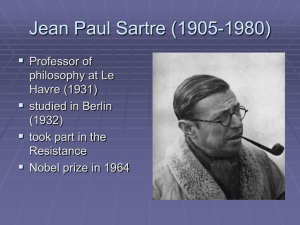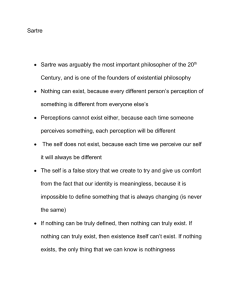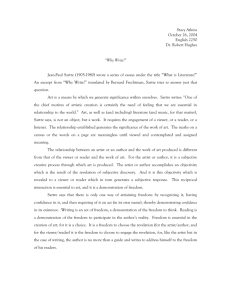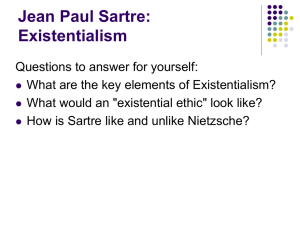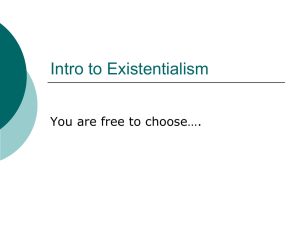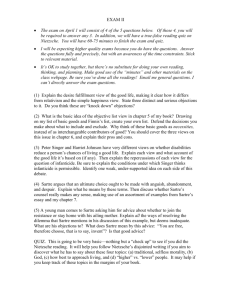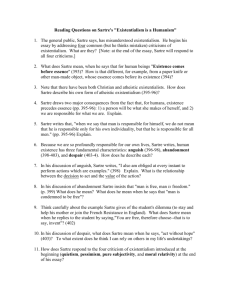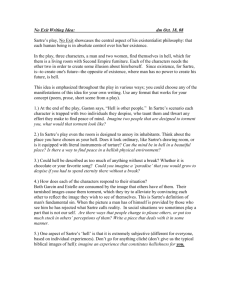(Word .doc, Ch. 9 (2009 ed.)
advertisement
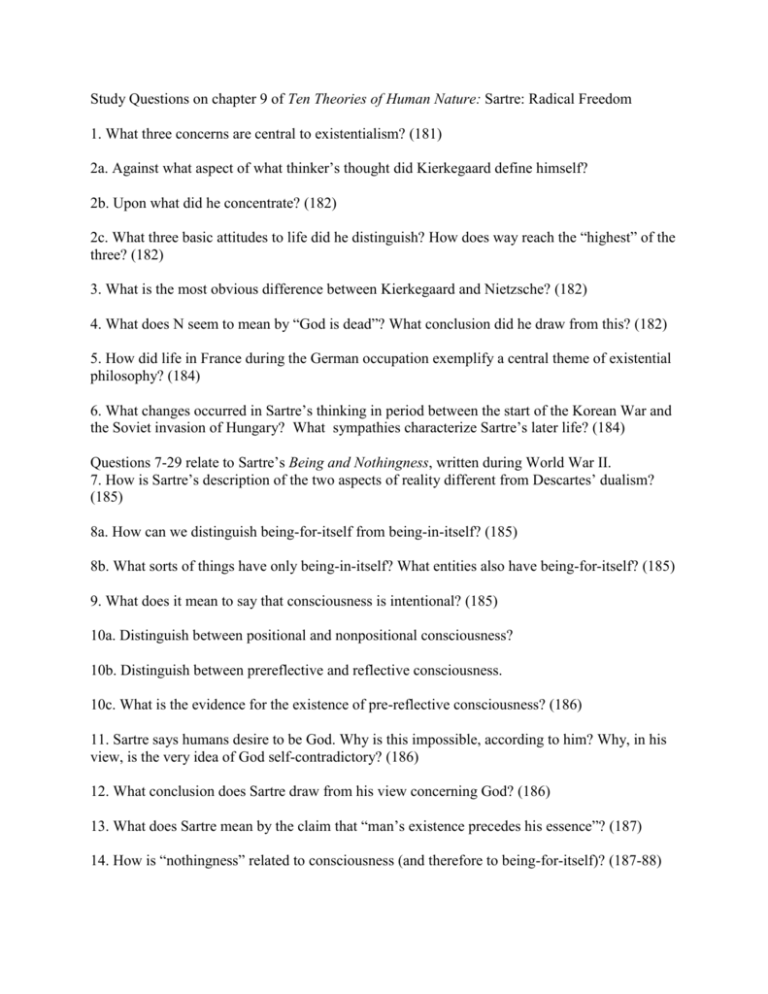
Study Questions on chapter 9 of Ten Theories of Human Nature: Sartre: Radical Freedom 1. What three concerns are central to existentialism? (181) 2a. Against what aspect of what thinker’s thought did Kierkegaard define himself? 2b. Upon what did he concentrate? (182) 2c. What three basic attitudes to life did he distinguish? How does way reach the “highest” of the three? (182) 3. What is the most obvious difference between Kierkegaard and Nietzsche? (182) 4. What does N seem to mean by “God is dead”? What conclusion did he draw from this? (182) 5. How did life in France during the German occupation exemplify a central theme of existential philosophy? (184) 6. What changes occurred in Sartre’s thinking in period between the start of the Korean War and the Soviet invasion of Hungary? What sympathies characterize Sartre’s later life? (184) Questions 7-29 relate to Sartre’s Being and Nothingness, written during World War II. 7. How is Sartre’s description of the two aspects of reality different from Descartes’ dualism? (185) 8a. How can we distinguish being-for-itself from being-in-itself? (185) 8b. What sorts of things have only being-in-itself? What entities also have being-for-itself? (185) 9. What does it mean to say that consciousness is intentional? (185) 10a. Distinguish between positional and nonpositional consciousness? 10b. Distinguish between prereflective and reflective consciousness. 10c. What is the evidence for the existence of pre-reflective consciousness? (186) 11. Sartre says humans desire to be God. Why is this impossible, according to him? Why, in his view, is the very idea of God self-contradictory? (186) 12. What conclusion does Sartre draw from his view concerning God? (186) 13. What does Sartre mean by the claim that “man’s existence precedes his essence”? (187) 14. How is “nothingness” related to consciousness (and therefore to being-for-itself)? (187-88) 15a. What two Freudian claims does Sartre reject? 15b. What, in Stephenson’s view, is weak about his rejection of the second? (188) 16a. What is striking about Sartre’s view of the emotions? 16b. How does this relate to his position on freedom? (188) 17. What, for Stephenson, seems to be correct about Sartre’s view of the emotions? (188) 18a. Why is it wrong, according to Sartre, to disavow responsibility for long-lasting features of our personality or character? (188-89) 18b. How does Stephenson critique Sartre’s view here? (189) 19a. When is our freedom clearly manifested to us? 19b. How does Sartre understand the term translated “anguish”? Distinguish it from fear. (189) 20. What is Sartre’s “metaphysical diagnosis of the human condition”? (189) How does Sartre understand mauvaise foi (moh-VEZ fwah), usually translated “bad faith”? (189-90) 21. Discuss either of the two cases presented on p. 190 in terms of how they supposedly illustrate “bad faith”? 22. What sort of “good faith” or “sincerity” does Sartre describe? Why does he criticize it too? (191) 23. What kind of awareness do we have of other people’s mental states? What kind of power does the look (also: gaze) of another have over us? (191-92) 24a. For what disputable thesis does Sartre argue? 24b. Explain: the threat and the strategies Sartre recognizes to ward it off. 24c. Why does Stephenson say that Sartre’s outlook “at this stage” (Being and Nothingness) is “bleak indeed”? (192) 25. What contradiction does Sartre slip into, if Stephenson’s rhetorical questions are on target? (192) 26. What does Sartre seem to recommend? What can’t he recommend? (192-93) 27. To what intrinsic value does Sartre commit himself? What can we learn from Sartre about consciousness? (193) 28. What does Sartre claim about each person (194, 3rd full para.)? Is this universally correct? (Why or why not?) 29. What problems does Stephenson note about the claim that no reasons can be given for fundamental [value] choices? (194-95) 30. What did Sartre come to recognize more explicitly (after Being and Nothingness) ? (195) 31. How does he understand “authentic man” at this point? How are relations with other people now transformed? (196) 32. What value judgment is now contained in Sartre’s basic value? (196-97) 33. What does he seem to mean by a phrase (distantly) inspired by Augustine and Kant? (197) 34. What modifications to his earlier views of the human situation does Sartre make in the 1950’s (197 bottom)? 35a. As Sartre develops his ideas in the 1960’s, what does he mean by “integral humanity”? 35b. Why does Stephenson say he is beginning to move in an Aristotelian direction? (Note: Aristotle does not much discuss “need” in the modern sense, but he does recognize that some of our desires are rooted in our human biological nature.) (198-99) 36a. How, according to Sartre, are (most?) humans “mad for an unattainable infinite”? (199) 36b. What kind of justification does (most?) people desire? Does Sartre think this is a mistake? (199) 37. In Sartre’s last synthesis, what aspects of traditional Western religious thought and Platonic philosophy does he [still?] leave behind? (199)

